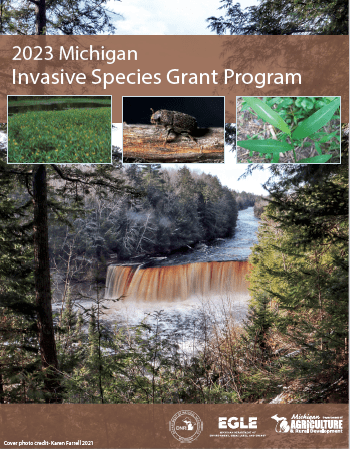The web Browser you are currently using is unsupported, and some features of this site may not work as intended. Please update to a modern browser such as Chrome, Firefox or Edge to experience all features Michigan.gov has to offer.
$3.6 million in grants available for invasive species projects
October 04, 2023
Michigan’s Invasive Species Grant Program is now accepting proposals for the 2023 funding cycle, with an anticipated $3.6 million available to applicants.
The program – a joint effort of the Michigan departments of Natural Resources; Environment, Great Lakes, and Energy; and Agriculture and Rural Development – is part of a statewide initiative launched in 2014 to help prevent, detect and control invasive species in Michigan.

An invasive species is one that is not native and whose introduction causes harm, or is likely to cause harm, to Michigan's environment, economy or human health.
“Invasive species threaten Michigan’s aquatic and terrestrial ecosystems, harming our environment, agricultural economy, and natural resources,” said Tim Boring, director of the Michigan Department of Agriculture and Rural Development. “The Michigan Invasive Species Grant Program is an important tool in addressing these threats – both on the local level with cooperative invasive species management areas and on a statewide scale by supporting advances in prevention and control.”
Program handbook
The 2023 grant program handbook outlines program priorities and application guidelines.
2023 priorities
The program supports projects that will prevent the introduction or spread of invasive species by engaging the public in prevention practices and reducing the risk of moving invasive species into high-risk areas.
The program also encourages proposals for methods or studies that lead to increased public participation in invasive species prevention through actions like cleaning recreational equipment between uses or purchasing local firewood.
Proposals aiding early detection and response efforts for species on Michigan’s invasive species “watch list” and proposals increasing regional or statewide response preparedness for new or emerging invasive species are also requested.
To manage invasive species already established in Michigan, the program targets proposals for novel and efficient control techniques and projects that improve detection and control methods through increased understanding of species biology and ecology.
Proposals to develop or improve tools, such as risk assessments and prioritization models, to inform management and control decisions also are encouraged.
Support is offered to cooperative invasive species management areas, or CISMAs, across the state to implement strategic plans for outreach, detection and control of regional priority species.
Program progress
The Michigan Invasive Species Grant Program supports projects throughout the state that prevent, detect, manage and eradicate invasive species on the ground and in the water. Total program funding is set by the Legislature and the governor during the annual budget cycle.
In the last nine years, the program has awarded over $32 million to 238 projects, resulting in management of invasive species including hemlock woolly adelgid insects, European frog-bit plants and mile-a-minute weed. Because of this program, more than 592,000 acres of land and water have been surveyed and approximately 51,000 acres have been treated for invasive species.
Highlights of the 2022 invasive species program are available in the Michigan Invasive Species Program Annual Report, which includes program-funded projects.
Regional CISMAs operate in all of Michigan’s 83 counties, assisting the public in identifying and managing invasive species. Contact information for individual CISMAs can be found at Michigan.gov/Invasives in the Take Action section.
Important program dates and information
Local, state, federal and tribal units of government, nonprofit organizations and universities may apply for funding to support invasive species projects in Michigan. Full project proposals are due Nov.1. Award announcement is anticipated in March 2024.
Grant requests for general projects can range from a minimum of $25,000 to a maximum of $400,000. CISMAs can request up to $70,000 for annual implementation of prevention, detection and control activities and up to $40,000 for specific outreach and/or survey and treatment projects.
For the 2023 application cycle, there are no match requirements, and match documentation will not be accepted as part of the application.
Competitive applications will outline clear objectives, propose significant ecological benefits, demonstrate diverse collaboration and show strong community support.
All applications must be submitted through the MiGrants online system. Applicants can access the system at MiGrants.Intelligrants.com or follow the link at Michigan.gov/MISGP.